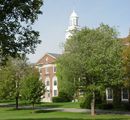Difference between revisions of "Metal ions and metalloproteins"
(Start page) |
(Add picture & template) |
||
| Line 1: | Line 1: | ||
| + | {{MainNavigation}} | ||
Metal ions are essential nutrients for all organisms and play important roles in many biochemical processes. The diverse network of proteins and enzymes involved in intra- and inter-cellular metal trafficking pathways is very complex but highly specific and tightly regulated. Abnormal cellular metal ion concentrations may lead to oxidative damage (particularly for redox-active metals such as Cu and Fe), various diseases and cell death. While many aspects of metal-ions trafficking have been addressed by biochemists and cell biologists, chemists provide yet another layer of information that is crucial to a better understanding of these transport pathways, whether it is related to metal-ions specificity, affinity, kinetics and thermodynamics. Understanding the molecular and mechanistic details of metalloenzymes and the processes they undergo opens up opportunities for metal-ion chelation, detoxification, anti-tumor and anti-cancer therapies. This symposium will address various aspects of metal ion homeostasis and discuss structure-function relationships of a number of metal-ion binding, transport and storage proteins and processes. | Metal ions are essential nutrients for all organisms and play important roles in many biochemical processes. The diverse network of proteins and enzymes involved in intra- and inter-cellular metal trafficking pathways is very complex but highly specific and tightly regulated. Abnormal cellular metal ion concentrations may lead to oxidative damage (particularly for redox-active metals such as Cu and Fe), various diseases and cell death. While many aspects of metal-ions trafficking have been addressed by biochemists and cell biologists, chemists provide yet another layer of information that is crucial to a better understanding of these transport pathways, whether it is related to metal-ions specificity, affinity, kinetics and thermodynamics. Understanding the molecular and mechanistic details of metalloenzymes and the processes they undergo opens up opportunities for metal-ion chelation, detoxification, anti-tumor and anti-cancer therapies. This symposium will address various aspects of metal ion homeostasis and discuss structure-function relationships of a number of metal-ion binding, transport and storage proteins and processes. | ||
==Organizer== | ==Organizer== | ||
| − | Dr. Fadi Bou-Abdallah is an assistant professor of chemistry at SUNY Potsdam http://www2.potsdam.edu/bouabdf/. He obtained a BS in chemistry from the Lebanese University (in Lebanon) and a PhD in physical chemistry from the University of Paris VI (France). Prior to joining SUNY Potsdam, he was a Research Scientist at the University of New Hamsphire where he did his postdoctoral work on the iron storage protein, ferritin. His research interests are in the areas of iron-protein biochemistry in particular proteins involved in the metabolism of iron, i.e. ferritin and transferrin. The overall goal of his research program is to elucidate the structure-function relationships in these and other metal-ion trafficking proteins and their mechanisms of interaction with various metal-ions. | + | [[File:BouAbdallah.jpg|120px|left]]Dr. Fadi Bou-Abdallah is an assistant professor of chemistry at SUNY Potsdam http://www2.potsdam.edu/bouabdf/. He obtained a BS in chemistry from the Lebanese University (in Lebanon) and a PhD in physical chemistry from the University of Paris VI (France). Prior to joining SUNY Potsdam, he was a Research Scientist at the University of New Hamsphire where he did his postdoctoral work on the iron storage protein, ferritin. His research interests are in the areas of iron-protein biochemistry in particular proteins involved in the metabolism of iron, i.e. ferritin and transferrin. The overall goal of his research program is to elucidate the structure-function relationships in these and other metal-ion trafficking proteins and their mechanisms of interaction with various metal-ions. |
| + | |||
| + | |||
| + | |||
| + | |||
==Invited speakers== | ==Invited speakers== | ||
Revision as of 21:57, 31 December 2009
Metal ions are essential nutrients for all organisms and play important roles in many biochemical processes. The diverse network of proteins and enzymes involved in intra- and inter-cellular metal trafficking pathways is very complex but highly specific and tightly regulated. Abnormal cellular metal ion concentrations may lead to oxidative damage (particularly for redox-active metals such as Cu and Fe), various diseases and cell death. While many aspects of metal-ions trafficking have been addressed by biochemists and cell biologists, chemists provide yet another layer of information that is crucial to a better understanding of these transport pathways, whether it is related to metal-ions specificity, affinity, kinetics and thermodynamics. Understanding the molecular and mechanistic details of metalloenzymes and the processes they undergo opens up opportunities for metal-ion chelation, detoxification, anti-tumor and anti-cancer therapies. This symposium will address various aspects of metal ion homeostasis and discuss structure-function relationships of a number of metal-ion binding, transport and storage proteins and processes.
Organizer
Dr. Fadi Bou-Abdallah is an assistant professor of chemistry at SUNY Potsdam http://www2.potsdam.edu/bouabdf/. He obtained a BS in chemistry from the Lebanese University (in Lebanon) and a PhD in physical chemistry from the University of Paris VI (France). Prior to joining SUNY Potsdam, he was a Research Scientist at the University of New Hamsphire where he did his postdoctoral work on the iron storage protein, ferritin. His research interests are in the areas of iron-protein biochemistry in particular proteins involved in the metabolism of iron, i.e. ferritin and transferrin. The overall goal of his research program is to elucidate the structure-function relationships in these and other metal-ion trafficking proteins and their mechanisms of interaction with various metal-ions.

